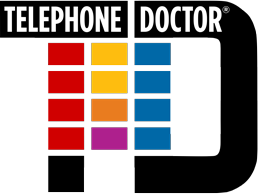By Nancy Friedman, Telephone Doctor
Believe it or not, there are many, many ways to sabotage your business. And, chances are, your staff is doing some of these now, without your even knowing it. And worse yet, you’ve probably even heard some of this yourself (ouch!). That’s the bad news.
The good news is, through our many Telephone Doctor surveys, we’re able to bring to you the top five sabotage practices and then show you how to neutralize the effects. So, get ready. You and your staff are about to be in a much better position to handle: The Five Top Ways to Sabotage Your Business Today:
1. It’s Not Our Policy
This, unfortunately, is used more as an excuse than anything else. It’s a sure thing that the employee has not been shown how to explain a policy to someone. This phrase is used, then, more as something to say when the employee doesn’t know what to say. The customer then calls that an “excuse.”
When the customer hears “it’s not our policy,” they immediately respond (usually silently) with, “WHO CARES?” What a business needs to understand is, no one but the management and staff cares about your policies. Do you really think the customer says to himself or herself as they enter or call your place of business, “Gee, I wonder what their policy is on this issue?”
All this being said, there are companies who do have policies that make it more difficult to work with them than with others. So here’s a suggestion: Decide on your policy, then work as a team with your staff to find a positive way to explain it to the customer. Otherwise, it’ll be the customer’s policy not to do business with you!
2. It’s Not My Department
Well, then whose is it? Let’s remember one of the Telephone Doctor mottos: Tell the customer what you do, not what you DON’T do. If someone mistakenly gets to your extension and asks for something that you don’t handle, the following is far more effective: “Hi, I work in the paint department. Let me get you to someone in the area you need.” This is far more effective than telling someone it’s not your department. (Let’s not say, “YOU have the wrong department.” Take full responsibility with the “I” statement.)
3. My Computer’s Down
Yeah, yeah, yeah. We’ve all heard that one. And Ouch! That one hurts because there are still many customers who remember the days BEFORE the computer. My goodness, how did we ever survive? Sure it’s easier to have the computer but, believe it or not, millions of businesses were launched and operated on 3 x 5 cards or some other type of manual database.
When your computer crashes, this sounds so much better: “I’ll be delighted to help you…it may take a little longer as I’ll need to do things by hand…our computers are currently down.” This way you’ve still explained what happened and they’ll have a little more compassion as you’ve offered assistance – and didn’t simply blame the computer for your inability to help.
4. I Wasn’t Here That Day (or I was on vacation when that happened)
This one personally really makes me laugh. Does that excuse the company? I don’t remember asking them if they were there that day. Do you really think the customer cares if you weren’t here when their problem happened? Honestly, they don’t, so that’s not even an issue to discuss. Just hit the problem head on – apologize without telling them where you were…or weren’t. Remember, you ARE the company whether you were at work or on vacation when the issue occurred.
5. I’m NEW
SO? OK, you’re new. Now what? Does being “new” allow you to be anything but super to the customer? When the customer hears this sabotaging statement, do you really think they say: “Oh, so you’re new? So that’s why I’m getting bad service? Well, then that’s okay…you’re new… no problem.”
Yes, even if you are new, the customer honestly believes you should know everything about your job.
Here’s the Telephone Doctor method on this one. You can tell the customer, “Please bear with me, I’ve only been here a few weeks.” That will buy you time. For whatever reason, hearing the short LENGTH of time you are with the company means more to the customer than, “I’m new.” Again, it’s more of an “excuse.” Remember to state the length of time. It’s a creditability enhancement. “I’m NEW” is a creditability buster.
# # #
Nancy Friedman is a featured speaker at franchise, association & corporate meetings. She has appeared on OPRAH, Today Show, CNN, FOX News, Good Morning America, CBS This Morning & many others. Nancy is the author of 8 books on sales and customer service and is the spokesperson in the popular DVD customer service training programs. For a demo of Nancy call 314 291 1012 or visit www.nancyfriedman.com.
